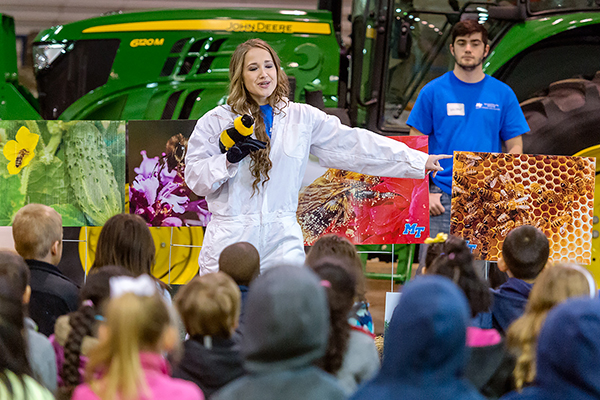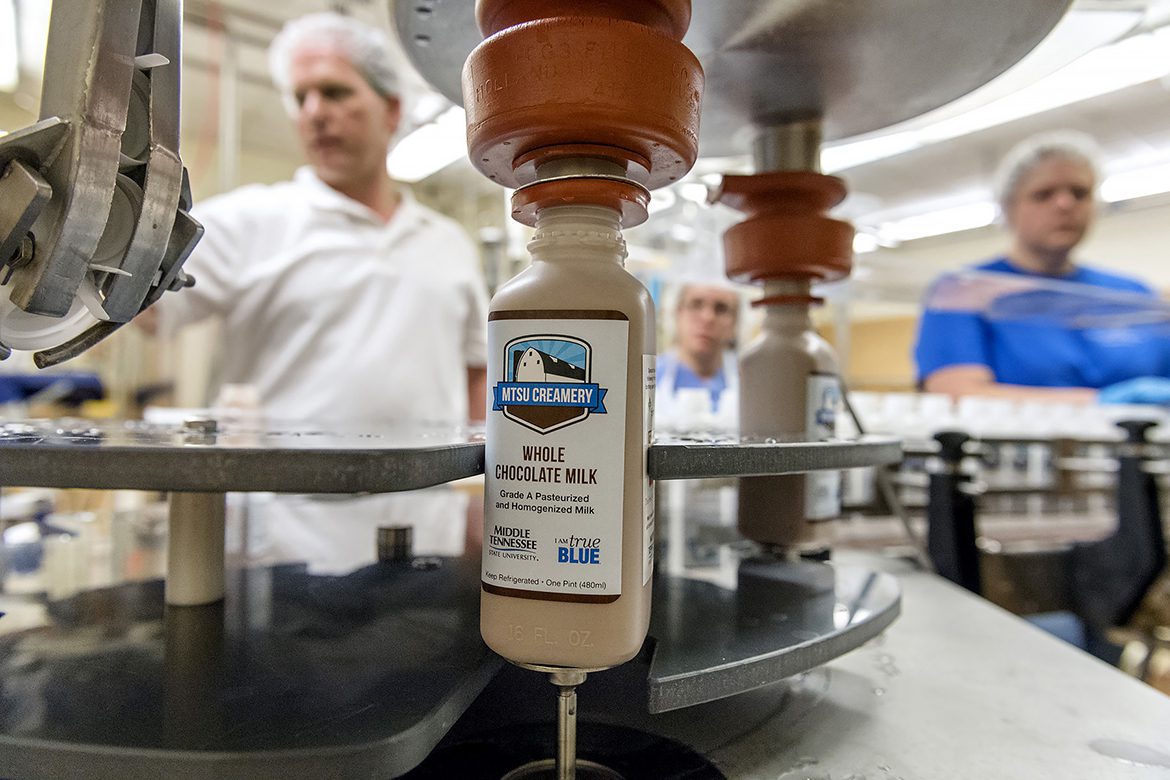Surviving the zombie apocalypse, your favorite meal and why agriculture should be important to you.
“If you eat you’re involved in agriculture.”
In a country where only 2% of people are involved in agriculture (Fast Facts About Ag) many of us are out of touch with what really goes into the things that we need to survive every day. Here at MTSU, we have an extensive agriculture department (School of Agriculture) with over 500 undergraduates who are preparing for a career to make sure you have what you need to survive. Here’s what MTSU’s agriculture department wishes every student here at MTSU knew about agriculture.
It’s a complicated process.
When was the last time you had a meal and thought about the farmer’s hands that grew it? That burger you ate last week- a farmer had to raise that cow for over a 1,000 days to allow you to enjoy it. What about those strawberries you had for breakfast? Think about planting the seed, covering the plants in the winter, pulling them out of the ground, making sure they were the best quality for you to enjoy. Then getting them to a packaging center, sending them to the store so a worker can put them on a shelf for you to grab the carton quickly as you try to see how fast you can get out of the store.

MTSU freshman agribusiness major Rachel Elrod of Eagleville, Tennessee, tells youngsters from the Rutherford County Schools how bees bring honey at one of the agriculture-related stops at the April 12 Agricultural Education Spring Fling in the Tennessee Livestock Center. (MTSU photos by J. Intintoli)
“It’s so convenient to just go to the store. If you didn’t grow up with an agriculture background, you don’t really think about how much work goes into everything you buy at the store,” said Nick Waynick, MTSU Agribusiness lecturer. Dr. Jessica Carter, director of the MTSU School of Agriculture, encourages students to talk to those involved in agriculture to gain a better appreciation for where their food comes from.
U.S. agriculture has a lot to brag about
The U.S agricultural industry accounts for 5.5% of the country’s gross domestic product. Professor Nick Waynick talks about how complex our food chain really is and how if just one part of it breaks down- where would our country be?
In fact, the U.S. food supply has the “safest, least expensive, and most bountiful in the world, and unfortunately, we take it for granted.” said Dr. Tony Johnston from MTSU Fermentation Science.
Johnston also highlights how blessed we are as a country as we potentially could be self- sufficient and not have to import any food.
“Although it seems impossible, we are fortunate enough to live in one of the few countries in the world that produces more food than we consume, and we could, very easily, survive (and prosper) without importing any food,” said Johnston.
This shows just how diverse U.S. agriculture is. Many countries have to rely on us for food to even survive!
MTSU students in the Agriculture department are working on similar initiatives and trying to find more ways to sustainably feed other countries that don’t have fertile climates and resources.
Ag Education Can Change the World
98% of the population (Ag Stats) depend on stores to provide us food without having any knowledge of agriculture, so it is becoming increasingly more important to educate the younger generations about the ins and outs of agriculture.
I know what you’re thinking…Why? As Dr. Johnston puts it, “I am convinced that if the zombie apocalypse, a catastrophic collapse in trade, or the loss of all long-distance transportation occurred and somehow our government managed to get a cow or bull, hog or boar, chicken or rooster, and a bag of a grain seed to each of us, we’d almost all starve to death.”
I mean if that doesn’t shake you to your core and make you want to consider taking an agriculture class as an elective…hope might already be lost for you 😉
Professor Chaney Mosey of MTSU Agriculture Education wishes that students here at MTSU knew that they could get their teaching license to teach agriculture in middle or high school while they major in another ag-related field.
“For those who want to teach, but don’t necessarily like math, English or one of the main subjects, agriculture education may be a career for them,” said Professor Mosey.
For me personally, my agriculture teachers had the biggest impact on me throughout high school. As an ag teacher, you have the opportunity to become an FFA advisor and mentor kids on leadership, public speaking, and career skills that will help them succeed in the future- exactly what my ag teachers did for me.
Want a really hands-on major? Agriculture has you covered
When you are involved in the agriculture department, you are not just in a classroom. You are out at one of our four MTSU Farm Laboratories getting hands-on experience with a variety of animals, plants, and crops, and the latest agriculture technology.
One of the coolest things you can be a part of is our very own MTSU Creamery- where you can be involved in milking our dairy cows, processing the milk, and packaging it to be sold around campus and other local restaurants! Check out this super awesome video to find out more!
Dr. Carter, director of the school of agriculture, emphasizes that being an agriculture major is based around science, but instead of being in a lab, you are out in the field dealing with real issues to prepare you for a career in agriculture.
So, if you are one who is ready to be out of the classroom getting your hands dirty, consider a major in agriculture.
Organic doesn’t mean “healthier…”
…Or more nutritional. Dr. Maegan Hollis, an MTSU Animal Science professor, says that the biggest thing she wishes people understood about agriculture is that “organic” doesn’t mean better.
“Organic means they don’t get antibiotics. So, when a cow, for example, is sick it can’t be treated.”
Dr. Hollis shared with me that many organic farms actually have a sister commercial farm that they send sick animals too so they can actually be treated.
Organic isn’t necessarily better for the environment, either.
“If every beef farm was organic, we would need 10 million more cows which would release 18 million more tons of carbon emissions,” said Professor Hollis.
So, next time you go to spend more money on an organic label, shoot a DM to one of your friends who is an Agriculture major to see it is really worth it.
MTSU agriculturalists love their animals and want to preserve the environment
Dr. Hollis also really wants students to understand that agriculturalists do love their animals and care for them.
“Well cared for animals equal productive animals. It’s in our best interests to make sure our animals are happy since it will bring us a better yield.”
Many humane societies try to market the worst of the worst for agriculture so I can encourage you to talk to a student who has livestock to see just how much they care for our animals.
My best friend’s family owns a farm that has an extensive hog operation and I have personally see how much she cares for her pigs. She makes sure they have plenty of area (with lots of mud!) to roam around in, always have food and water, and get plenty of exercise!
Another misconception that many people have is that agriculturists are destroying the environment rather than working to preserve it. Dr. Kevin Downs, an MTSU Animal Science professor, wishes students knew that “agriculturalists work on a daily basis as stewards of the land and as the ultimate animal welfare advocates.”
It benefits agriculturists to take care of the land and make sure we are not exhausting it or releasing bad chemicals into the air so that generations of farmers after them can use the land to continue to feed the world.
Whether you realize it or not agriculture is the staple of your everyday life. From the sheets on your bed to the clothes you put on in the morning, to breakfast, lunch and dinner- not to mention the multiple coffee breaks you take every day- your daily life basically revolves around some form of agriculture.
With over five undergraduate programs including agribusiness, animal and horse science as well as extensive ag organizations, MTSU is a great place to get in touch with your inner farmer and realize just how important the ag industry is to your everyday life.
If I have inspired you to get your hands dirty, you can reach out and follow the MTSU Ag Department Instagram page and see how you can get involved.


COMMENTS ARE OFF THIS POST